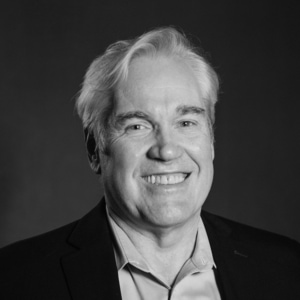
How to maximize your marketing budget (whatever it is)
Check out our easy-to-understand guide to help you make the most of your marketing budget (regardless of how big it is).

Our Accelerator Interview series, “Thinking Big” is our way of sharing insights from successful entrepreneurs, business leaders, and CEOs within the Kinesis community.
 When it comes to the Oregon business landscape, one industry has a particularly large footprint. Manufacturers account for almost 30% of Oregon's output, and have a massive impact on our state's economy. In recent years, manufacturing has been faced with substantial changes in technologies, resources, and (along with the rest of the skilled trades) a shrinking talent pool - which means that manufacturers have had to get creative, think strategically, and change decades-old thinking to compete in a global marketplace.
When it comes to the Oregon business landscape, one industry has a particularly large footprint. Manufacturers account for almost 30% of Oregon's output, and have a massive impact on our state's economy. In recent years, manufacturing has been faced with substantial changes in technologies, resources, and (along with the rest of the skilled trades) a shrinking talent pool - which means that manufacturers have had to get creative, think strategically, and change decades-old thinking to compete in a global marketplace.
Here to weigh in on these pressures (including best practices for growth) is one of Oregon's leading experts on manufacturing, Chris Scherer.
Tell us a little bit about OMEP and your role.
 OMEP is a not-for-profit agency established on 1996. We are a private-public partnership funded by federal, state, and client company funds with a total staff of 20, including 15 consulting professionals. Our “long-form” mission is to create a stronger Oregon economy by helping small- to mid-sized Oregon manufacturers become globally competitive. Our one-word mission is Results.
OMEP is a not-for-profit agency established on 1996. We are a private-public partnership funded by federal, state, and client company funds with a total staff of 20, including 15 consulting professionals. Our “long-form” mission is to create a stronger Oregon economy by helping small- to mid-sized Oregon manufacturers become globally competitive. Our one-word mission is Results.
I have had the pleasure of serving as OMEP’s President since 2010. Prior to that I worked as a consultant and CFO to the organization for about 8 years.
It means a lot that when asked to describe your company, one of the first things you reference is your mission statement. We think about that quite a bit here at Kinesis. How would you say OMEP’s mission and values have helped to shape the business?
We have always been mission-focused. We bring results (like shorter lead times, higher quality, and reduced costs) to small- and mid-sized Oregon manufacturers – and those results make all the difference on the bottom line. Also, our values – Solve Problems Thoughtfully, Help Each Other Out, Create Prosperity, and Commit to Client Success – are integral to our company culture.
We’re passionate in our commitment to client success, and we like to talk about “co-owning” the company problem that we are helping to solve. Our values support a team environment, which we spend a great deal of time nurturing. As we say, “we help each other out.” OMEP is lucky to have some very talented manufacturing generalists and specialists, but no one of us has all the skills needed by a given client. We are adamant about making sure that we deploy the right person with the right skill set to each client issue, and our core values serve to remind us of the importance of this approach.
You’ve been with OMEP for 14 of its 20 years, and the economy has seen some dramatic shifts during that time. What were some of the strategic moves OMEP has made to adjust to the changing marketplace?
Gosh, we like to think we’re strategically driven and are always adapting to the economy and our client’s needs. Clearly, however, there have been some big bang changes that have affected us over the last decade.
Pre-great recession, companies were struggling to compete with the off-shoring trend – and so we were very focused on helping companies increase their productivity. Post-recession, we have responded to a demand for assistance in utilization of existing and created capacity – more of a growth focus and greater emphasis on strategy, while maintaining and improving operational excellence. Most recently, the competition for qualified workers has prompted us to develop services that help companies hire, train, and retain employees. I would call this a long-overdue demand from companies.
It sounds like you’ve done a great job of answering the needs of the market. At OMEP, I know you talk a lot about “bending the service around the demand.” How has this influenced OMEP’s approach to serving clients, and can you share some of your thoughts around templatized versus customized solutions?
I think probably every decent consulting firm makes a fair claim to providing clients with custom solutions. However, at OMEP we attempt to make this “bending the service” approach more apparent by always asking, “What problem are we trying to solve?” and, “What is your longer-term strategic objective?”
I think a good example of this has to do with our application of Lean Enterprise principles at client manufacturing sites. Without question, lean is part of our DNA. We believe that when adopted as a business operating system, it provides a template for business owners that, properly applied, will lead them in the correct direction.
However, some years ago we revisited our mission and realized that we were in danger of being defined as ”the lean store” – more about the delivery method than helping companies become more competitive. We happen to think lean is the best thinking currently available, but would happily switch to a new approach if we found it to be superior (although, I must admit, that seems doubtful). In any case, OMEP is about supporting the Oregon economy through the success of its manufacturing industry – not bringing lean to the world. I think it’s important to maintain that connection to your customers and their end-goal, rather than becoming too focused on a singular tactic or service.
In your years of working with manufacturers, what’s one business that stands out as an organization that “gets it?”
We’ve got several examples, but probably the most enduring success is a client in Salem that makes kitchen cabinet doors. The business is not particularly sexy and doesn’t conform to the economic developer’s dream of a high-tech industry, glamorous glass building. It’s a classic wood products company (which is still a big deal in the Oregon economy). Sawdust is always flying everywhere, and it has that nice lacquer smell that we baby boomers remember from shop class.
But what sets them apart is that their ownership has demonstrated the savvy to withstand all of the ups and downs of the residential construction market over the years by always seeking improvement. Other secrets to their success include:
I have to say that when it comes to fundamental business principles, there is no silver bullet. The list is pretty long, requires a strategic view, and will undoubtedly include lots of late nights. The result, however, is a growing and sustaining enterprise that is a great place to work and source of community pride.
On the flip side of the coin, what would you say is the most common mistake among the small business community?
Isolation. A failure to recognize that there is a community of public and private providers who have services and skills that can make you better. This isn’t necessarily a pitch for OMEP (although we’re happy to help) but a pitch for broad involvement in economic development, schools, workforce partners, and fellow businesses.
Given that you’ve managed to double OMEP’s number of clients served in the last 5 years and added numerous new positions to the company, what advice can you share with your fellow Manufacturing Extension Partnerships (MEPs) about the path to growth?
Well, there is wide variance among MEPs with respect to governance, state funding, and business model. However, I think that our demand-driven thinking is at the core of our success. The business press, federal and state government, and consulting commentariat are all full of ideas about the next big thing, but paying attention to customers and listening closely is a hard strategy to beat.
I guess that would be my advice to any business with ambitious growth goals – I’m neither a marketing nor manufacturing genius, but I think maybe that’s the secret sauce. Whatever your industry or focus area, listen to what the market is telling you, and find a way to meet that need.
Any other closing thoughts?
Just a shout-out to my manufacturing crew. Operating a plant is a really hard thing to do. Every day, operations staff face a changing dynamic of people, materials, and machines and have to stitch it all together so that the product gets out the back door on time to customers, at a level of quality that they demand, and at a cost that allows the business to be profitable. That’s a really big challenge and often overlooked in the headier discussions about manufacturing – the rise of 3D printing, the Internet of Things, collaborative robots, and other cool trending topics.
More than anything, manufacturing needs talent—including skilled workers and thoughtful and well-prepared managers. We need to figure out how to attract the best and brightest young folks to maintain our global edge in productivity and support a prosperous society.
To learn more about OMEP, visit their website or check out their innovative new recruitment and training program, Smart Talent.
Get insights like this straight to your inbox.